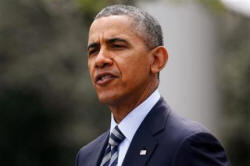 |
|

 Obama
Signs Law To Bar Iran Diplomat From Serving In U.N. Post
Obama
Signs Law To Bar Iran Diplomat From Serving In U.N. Post
[April 21, 2014] WASHINGTON (Reuters) — President Barack Obama signed a law on Friday that effectively bars an Iranian diplomat from serving as an envoy at the United Nations because of suspicions he was involved in the 1979-81 Tehran hostage crisis.
|
Obama signed a law passed by the U.S. Congress that blocks
any individual from entering the United States who has been
found to have been engaged in espionage or terrorist activity
against the United States or if that person may pose a threat to
U.S. national security. The United States had already said it would not grant a visa to
Iran's proposed U.N. ambassador, citing the envoy's links to the
1979-1981 hostage crisis. Obama had come under strong pressure
not to allow Hamid Abutalebi into the country to take up his
position in New York. The U.S. government objects to Abutalebi because of his
suspected participation in a Muslim student group that seized
the U.S. embassy in Tehran in November 1979 and held 52
Americans hostage for 444 days. The veteran Iranian diplomat has acknowledged that he acted as
an interpreter for the militants who held the hostages. The United States said a week ago it had told Iran it would not
give Abutalebi a visa. U.S. officials privately said at the time
they hoped Iran would quietly drop the issue and name a new
envoy. But Iran on Monday asked for a special meeting of a U.N.
committee on the U.S. decision, calling it a dangerous precedent
that could harm international diplomacy. (Reporting by Steve Holland; editing by Sandra Maler) [© 2014 Thomson Reuters. All rights reserved.] Copyright 2014 Reuters. All rights reserved. This material may not be published,
broadcast, rewritten or redistributed.
|


